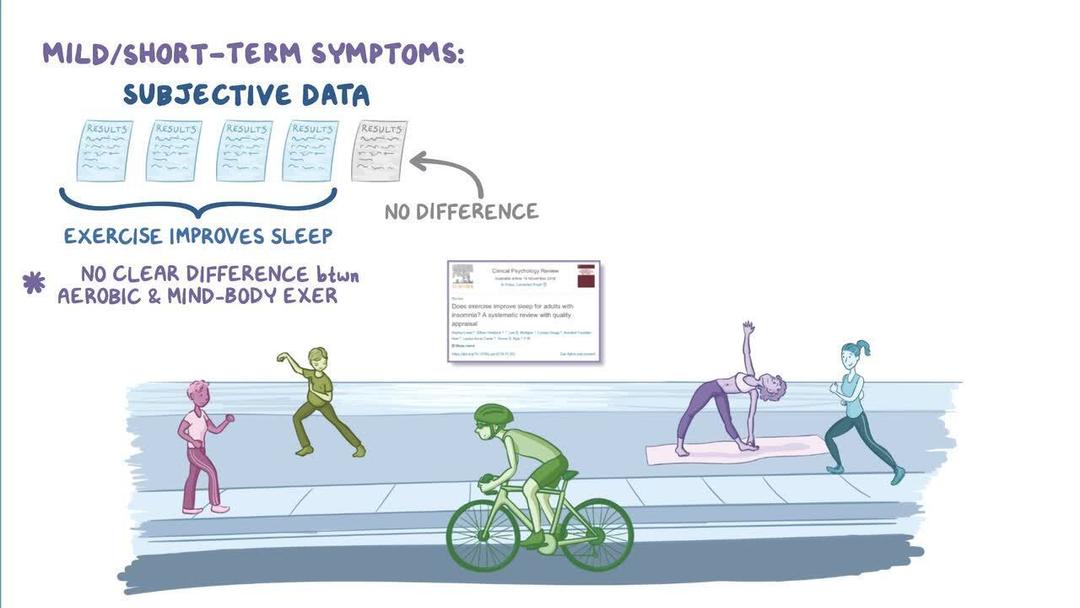
Does Exercise Help Decrease Insomnia?
Insomnia affects about a third of all people at some point in their life and it makes it difficult to either fall asleep or stay asleep. Sometimes it’s a mild, short-term symptom but if it’s severe and lasts a long time it’s considered a disorder. Either way, it leaves the person feeling exhausted. Unfortunately, treating insomnia is challenging. For example, sleep medications often have dangerous side-effects and can be habit forming, so they’re generally recommended for temporary use only after other options have been tried. Another treatment is cognitive behavioral therapy, which is effective, but requires clinical supervision which costs time and money.
This is where exercise comes in. Exercise is safe, can be done quickly and cheaply, and doesn’t require the help of a highly trained clinician. Also, exercise has been shown to improve sleep quality in a number of studies, and that’s why exercise is a core recommendation from the National Sleep Foundation to improve sleep. That said, while there are a number of clear benefits to exercise, only a few studies have looked at the relationship between physical exercise and insomnia, so whether or not exercise improves sleep for people with insomnia remains unclear.
To answer this question researchers looked at a number of studies that explored the link between exercise and symptoms of insomnia or insomnia disorder. They specifically looked at randomised clinical trials, where at least 30 minutes of either aerobic exercise, like cycling, or mind-body exercise, like yoga or Tai chi, were done per session, for at least 120 total minutes a week for several weeks, to see if that improved overall sleep in adults with insomnia. To measure sleep quality, the studies either used subjective data, like questionnaires and diaries or objective data, like actigraphy, which measures body movement through the night, or polysomnography, which measures brain waves, heart rate, and breathing through the night.
So what did they find? Well, let’s start with studies on individuals with mild or short-term insomnia symptoms. Four out of five studies that used subjective data, found that exercise improves sleep while the fifth study showed no difference between the exercise and the control group. There was no clear difference between aerobic and mind-body exercise in these studies. Similarly, two of the three studies that used objective data, found that exercise improves sleep. Interestingly, the study that didn’t show an improvement based on objective data did show an improvement based on subjective data that was collected in the same study. Now, let’s switch and look at studies on individuals with the more severe insomnia disorder diagnosis. Four out of five studies that used subjective data found that exercise helps, and again there wasn’t a clear difference between aerobic or mind-body exercise. On the other hand, all of the five studies that used objective data, found that exercise had no effect on insomnia disorder.
So where does that leave us? Well, to start out, this review is based on a relatively small number of studies that had small samples sizes—so the power was small—meaning that it can be hard to detect the effect of exercise and insomnia if that effect is small. Nevertheless, individuals with mild or short-term insomnia symptoms showed a benefit from exercise, and people with insomnia disorder reported benefiting as well, although the objective data for them doesn’t reflect that. In this case, perhaps the exercise is causing an improvement in mood or energy levels so that they’re not as affected by the insomnia as much, or perhaps the benefit was small and went undetected given the low power of the study. Regardless, the fact that people reported feeling better in terms of their insomnia symptoms probably justifies including exercise as part of the management strategy for anyone with insomnia. That said, while there are several hypotheses for why exercise helps improve insomnia the mechanism is not well understood. Therefore, several questions remain like is there an optimal type of exercise or duration of exercise that should be done to improve the symptoms of insomnia? More study is needed to make such recommendations.
Video credit: Osmosis from Elsevier (https://osmosis.org/)